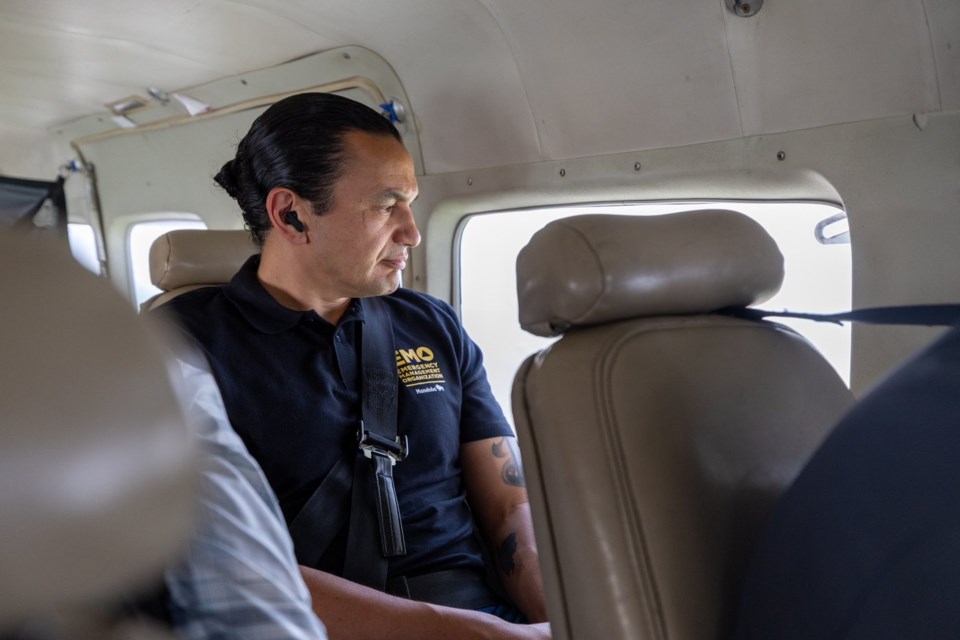WINNIPEG — Manitoba Premier Wab Kinew took to the air Thursday, touring areas hit by wildfire, meeting with firefighters and community leaders, and issuing a warning to hotel owners to free up more rooms for evacuees.
"We have emergency powers. We've been very restrained in how we're using them," Kinew said after landing back in Winnipeg.
"And we don't want to use them. So if people can step up, and those folks that are sitting on rooms potentially, voluntarily move forward and help us ... I think that's something that we all want to see in the province of Manitoba."
Kinew said the large majority of hotel operators have been great but "a small, small minority" have not made some rooms available for some of the 21,000 evacuees from Flin Flon, Pimicikamak Cree Nation and other areas.
Kinew mentioned seeing empty parking lots at some hotels, but did not share details of what information the government has. Some evacuees with children are entering their third week of sleeping in cots in emergency shelters, he said.
"I feel confident saying we know there's more that some in the hotel sector can do."
There are 21 wildfires across Manitoba, nine of which are out of control. Kinew took a helicopter ride near the biggest one -- a blaze that has covered 3,000 square kilometres near Flin Flon.
"This is just a huge, huge part of the province that has been burned," he said.
"We're in the helicopter there with somebody who's been in the Manitoba wildfire service for decades, and they said you used to have a big fire, you know, once every eight years or so. Now it's every single year."
Cooler temperatures and scattered rain have helped in some regions. The 600 residents of Cranberry Portage were notified they can return starting Saturday morning.
Also Thursday, the province confirmed it will be in charge of security going forward at the Leila congregate shelter in Winnipeg. This will be done with the help of police services from St. Anne and Winnipeg, as well as First Nations groups.
"It's really important to have solid security in place to keep Manitobans safe," said Lisa Naylor, minister of infrastructure.
Naylor would not provide information on what led to the switch or who was providing security services before the changeover.
Winnipeg police have committed to sending officers to evacuee shelters and hotels to ensure vulnerable residents aren't targeted.
In Saskatchewan, rain and favourable winds have helped crews keep fires at bay and allowed 7,000 residents in the La Ronge area to begin returning home.
Chief Tammy Cook-Searson of the Lac La Ronge Indian Band said on social media communities are “beyond excited” to have residents back.
“We missed you more than words can say,” she said. “As we reconnect and move forward together, support will be available for your mental health. You are not alone."
Lyle Hannan, the director of the La Ronge’s emergency operation centre, said gas stations, grocery stores and restaurants are open, while work is underway to get the hospital running.
“We had to go around and pick up all the residents’ garbage so they had an empty garbage bin to fill when they come home,” Hannan said late Wednesday.
Hannan said the Rona hardware store, Robertson Trading store and an air tanker structure at the town’s airport were destroyed by the fire.
He said he's heard some people are anxious to return.
“You miss home and you want to make sure you can see things and make sure everything is still here,” Hannan said.
Saskatchewan officials estimate between 10,000 and 15,000 people have been forced out by the fires.
The province is fighting 23 blazes, six of which have not been contained.
Both Manitoba and Saskatchewan have declared states of emergency to help different levels of government co-ordinate resources and relief.
Saskatchewan Premier Scott Moe’s government has promised to top up aid with $500 for every person over 18 who has had to relocate.
Moe made that announcement Wednesday while facing criticism from the Opposition NDP and the provincial ombudsman that his government failed to deliver immediate shelter, food and vital information to many running from harm’s way.
Ombudsman Sharon Pratchler said earlier this week her staffers have been overwhelmed trying to fill the void by connecting evacuees to food and shelter.
Pratchler said she is hearing of evacuees forced to sleep in cars and parents lacking essentials like diapers for their children.
Moe has said his government has done what it can to keep people safe from fires while fighting the swiftly moving conflagrations, but will strive to improve. The Saskatchewan Public Safety Agency says it has scaled up the number of people available to help those with immediate needs.
Opposition NDP Leader Carla Beck has said the $500 will help but said citizens deserve better than a province that appears to be doing its disaster planning “on the back of a napkin.”
Fires in Alberta have also forced scores from their homes, mainly in the remote north.
— with files from Jeremy Simes in Regina
This report by The Canadian Press was first published June 12, 2025.
Brittany Hobson and Steve Lambert, The Canadian Press



